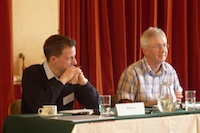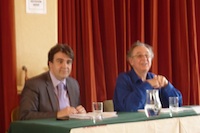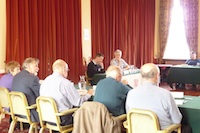“We meet on a weekend of elections,” said ILP chair David Connolly as ILPers and friends gathered in Scarborough on 5/6 May for the organisation’s annual weekend school of political debate and discussion.
“After the local election results we can perhaps see some glimmer of encouragement for Ed Miliband’s Labour Party,” he added.
Connolly was speaking just two days before Francoise Hollande clinched victory for the Socialists in the French presidential elections, a result, which “might just give us an idea of how much room for manoeuvre there is to construct an alternative response to the crisis”, he suggested.
It was to explore “the crisis”, its origins, ongoing nature and damaging effects, and to search for ways to respond, that had drawn people to the Yorkshire coast for two days of deliberation, called ‘Crisis, Markets and Protest’.
Survey
Will Brown kicked off proceedings with what Connolly described as “a tour de force”, a “comprehensive survey of the political scene and the circumstances that have led to it”.
Brown outlined how the crisis which has engulfed the world since 2008 has “left many people reeling on both left and right”.
 “No-one has come out of the crisis looking sure-footed, nor as if they can confidently ride out the storms around us,” he said. “In every important area of politics, the world has been either in flux or in crisis, either in revolution or locked in contradictions without easy solutions.”
“No-one has come out of the crisis looking sure-footed, nor as if they can confidently ride out the storms around us,” he said. “In every important area of politics, the world has been either in flux or in crisis, either in revolution or locked in contradictions without easy solutions.”
He described how national politics “in almost every corner of the world” has been altered in the last 18 months, how accepted tenets of economic policy and management have been brought into question, and how the balance of power in international politics has been tilted and transformed, the logic of international relations changed.
Brown focused specifically on the Euro crisis as exemplifying the complexities of the political and economic problems faced across the world, and the limits of austerity as a coherent response. “Indeed, perhaps, nowhere better reveals the depths of pre-crisis liberal hubris and post-crisis political sclerosis than the European Union,” he said.
“Although it has rightly been condemned as inept, the response of the EU to the growing crisis in Greece and other Eurozone economies has been hampered by genuinely difficult political problems,” he added.
As for the left, until now, it “has had few convincing arguments”, said Brown. “Critiques of austerity only really gain traction when alternatives become clearer – protests and saying ‘No’, however justified, are only the first step towards a more strategic view of political change.
“Europe is pinned between the logics of financial crisis and democratic popular opposition to austerity. In such a political impasse, real, lasting social harm is being inflicted on living standards and life-chances of the young, and on public services and collective provision.”
And the left searches for solutions, the danger of right wing extremism grows, as demonstrated by the success of Marine Le Pen’s Front Nationale in the first round of the French elections. For now, the left can expect “only modest change”, said Brown. While the pressures on left leaders are real, capitulation would do lasting damage to social democracy around the world.
“Do we have a hope of finding a way through?” asked Eric Preston in the following discussion. For former MP Harry Barnes, the need, as always, was to play “a double game of working to save what we have while pushing for greater transformation”.
“We should remember the money made by the wealthy over the recent period is enough to pay off our debts,” he added. “There is mileage here that has to be used.”
Many also found encouragement in the visible signs of resistance, from the Occupy movement, to UK Uncut, to young people prepared to challenge the system. “People are trying to find ways forward,” as Barry Winter put it.
Others saw the apparent dislocation of these groups from the mainstream political process as a worrying sign, and a number bemoaned Labour’s “lack of a comprehensive rethink”.
Marketisation
In the second session Tony Parsons, Unison’s regional organiser for Leeds and the Labour Link coordinator for West Yorkshire, assessed the ongoing marketisation of public services under the Coalition government, focusing in particular on the NHS, education and local government.
 “The Con Dems have austerity at the heart of their programme,” he said. “Their neo-liberalism goes hand-in-hand with privatisation.”
“The Con Dems have austerity at the heart of their programme,” he said. “Their neo-liberalism goes hand-in-hand with privatisation.”
Looking at the health service, he argued that the recent Health and Social Care Act will open the NHS to the rigours of the market. He pointed out that the private patient income cap had been raised to 49 per cent, to generate income that can go back into the NHS, argue the Tories.
“But this creeping privatisation started under New Labour,” said Parsons. “And the income has not gone back in to help doctors, nurses and the NHS. It’s gone into private pockets.”
Private sector “qualified providers” will cherry pick profitable parts of the NHS, such as knee and hip operations, which will then be denied to NHS patients, while more services will be outsourced. What this means for communities, he said, is longer waiting times, and more people encouraged to pay for operations if they can afford to.
“It is not only a fundamental betrayal of NHS principles, but a con,” he said. “The people who can afford to will be forced to pay twice, and the people who can’t will lose out on care.
“The result is that the value of our taxes is depleting. It’s not just that our services are going, it’s that we are being ripped off for what we are already paying.”
In education, he argued that the government are sewing the seeds of social division through their relentless push for more academies and free schools, while staff face an erosion of their terms and conditions.
“This is leading to a two-tier provision of education and health care driven by the excuse of austerity. It amounts to a mass erosion of people’s social taxes. People should be saying, ‘What do we get?’ We should be getting more.”
In local government, said Parsons, Eric Pickles is getting the chance to fulfill the vision he first had when leading Bradford Council in the late 1980s, a vision of slimmed down local authorities, services “externalized” to the private sector, and councils shrunk to a solicitor and an accountant.
“Much of what used to be publically provided has already gone,” he said. “The Localism Bill is just the next stage.
“They talk about this as the ‘big society’ but it’s a big con. They sell it as a way of giving power to local people, co-ops and the third sector, but it lets the private sector in by the back door.
“You need serious resources to run public services and local communities can’t do that. The Tories’ third sector agenda pushes down costs onto the service users and workers, and in the end they aren’t any cheaper than when we pay for them out of the public purse.
“As a movement we need to raise issues,” he concluded. “We need to ask what people are paying and what services they are receiving for those taxes.
“Capitalism can get out of this crisis through austerity, if everybody takes it, but we’ll have a much lower standard of living. We have to put pressure on for an alternative. If not we face a disaster.”
Opposition
The search for that alternative began in session three, or at least people examined the strengths and weaknesses of the opposition movements that have sprung up so far, and looked at what role the Labour movement and the ILP can play.
Much of the discussion focused on the pros and cons of social media and new technology to protest movements, a discussion highlighted by the arguments of the BBC’s Paul Mason and his book, Why it’s kicking off everywhere, and Malcolm Gladwell’s response to it in the New Yorker.
While Mason argues that the lack of hierarchy, or a coherent ideology, among new protest movements, plus their “free hit” of unmediated knowledge through peer-to-peer social media, makes it possible for them to imagine the end of capitalism, Gladwell suggests such networks are inadequate and superficial, that they rarely lead to “high-risk political activism” and ultimately lack the discipline to think through and enact strategies for systemic change.
The following discussion ranged over the merits and drawbacks of each argument but coalesced on a discussion of how the ILP should relate to protests. For one delegate, the three areas of coalition reform around the NHS, education and local government were priorities while others thought we should highlight changes to the world of work.
 Another echoed Parsons in urging the organisation to push the message about public services. “The public purse has been stolen,” he said. “It’s literally been given away.”
Another echoed Parsons in urging the organisation to push the message about public services. “The public purse has been stolen,” he said. “It’s literally been given away.”
The weekend ended with an open and enthusiastic discussion of how to celebrate the ILP’s 120th anniversary next year, how to most suitably remember the obstacles faced by our founders and pioneers in the 1890s, and recommit ourselves to their struggle.
Among the many proposals and suggestions, something became clear – it wasn’t just the recent local elections that gave this group a “glimmer of encouragement”, but our sense of the past as inspiration and, for all the depth of the crisis, a sense of the future as hope.
—
Read an updated version of Will Brown’s talk, ‘The crisis, Europe and the left’, here.
Why it’s kicking off everywhere: The new global revolutions, by Paul Mason, is published by Verso, priced £12.99.
‘Small Change: Why the revolution will not be tweeted‘ by Malcolm Gladwell, was published in the New Yorker.
Many thanks to Mike Wadsworth for photography.



5 June 2012
I really enjoyed the weekend too. It’s one of the few places I can discuss politics without getting bogged down in the latest fashionable reformist policy proposal or having to overcome unexamined socialist shibboleths which went down with the Berlin Wall.
One thing i got out of the discussions was that Paul Mason is better avoided. He uses a lot of fancy terms which mean less and less when you look into them and he blurs vital distinctions, so he can construct an impressive sounding thesis. I particularly love the use of ‘swarming’ to describe the arrangements for contemporary protest. B****cks!
I thought Will’s description of the international crisis was impressive and clearly expressed.
27 May 2012
As one of the audience at the discussion weekend, I think this is a fair summary of the points made by speakers. It was good to see the origins of the “crisis” and the response to it put into a left/socialist context. But the discussion, with points from the floor, also brought it to life.
The “bankers’ crisis” is, of course, not a new experience, and a bit of historical context (1929, the collapse under Major, etc) perhaps puts it in perspective. Whenever regulations are relaxed, and the banks are allowed to fall back on simple short-term greed, the rest of us end up paying.
Glad to have attended! Alistair Graham